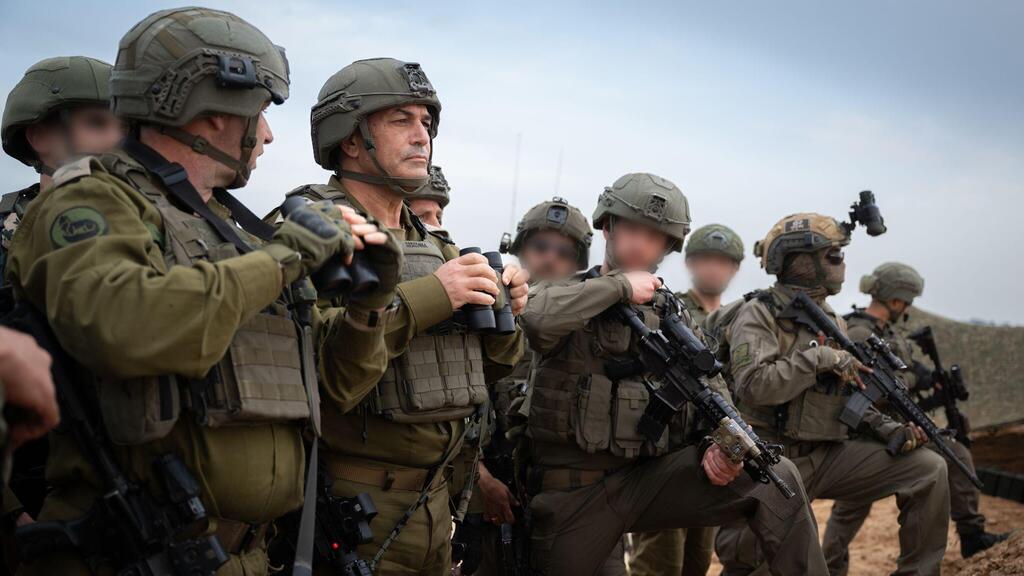After U.S. President Donald Trump issued a stark warning to Hamas if the terror group does not release Israeli hostages, a senior American official said Sunday, "He [Trump] wants all the hostages released immediately. If that doesn't happen, President Trump fully supports Israel in doing whatever is necessary to eliminate Hamas and bring the hostages home.”
Meanwhile, Hamas announced that a delegation led by its senior official Muhammad Darwish met Egyptian General Intelligence Service chief Hassan Rashad in Cairo to discuss the cease-fire agreement, hostage releases and displacement plans.
U.S. President Donald Trump with freed hostages delegation
According to Hamas, the delegation stressed the need to adhere to the agreement’s terms and called for "immediate negotiations on the deal’s second phase, the reopening of border crossings and the unrestricted entry of aid into Gaza."
The Prime Minister’s Office announced that an Israeli delegation will travel to Doha on Monday to advance hostage negotiations, responding to an invitation from mediators Egypt and Qatar, with U.S. backing. The delegation will include senior Shin Bet official "M.," Prime Minister Benjamin Netanyahu’s foreign policy advisor Ophir Falk, hostage coordinator Gal Hirsch and officials from the IDF and Mossad.
The announcement followed a security assessment led by Netanyahu amid concerns over the direct U.S.-Hamas negotiations. On Saturday, Al-Arabiya reported an agreement to extend the temporary cease-fire throughout Ramadan, but both Israel and Hamas denied the claim.
Later, Saudi network Al-Hadath reported, "Hamas has agreed in principle to extend the first phase (cease-fire and gradual hostage releases) by two months and to release live soldiers." The report has not been officially confirmed.
Israel has devised a series of escalating measures to increase pressure on Hamas, potentially leading to a full resumption of hostilities if the terror group does not return the remaining 59 hostages.
2 View gallery


Senior Hamas official Khalil al-Hayya, U.S. President Donald Trump, Prime Minister Benjamin Netanyahu
(Photo: AP/Ariel Schalit/Ohad Zwigenberg/Carlos Osorio/Reuters/REUTERS/Ibraheem Abu Mustafa)
The Wall Street Journal reported the measures began last week with a halt on goods and supplies entering Gaza. A source familiar with the plan said that if Hamas fails to release more hostages, Israel may escalate to renewed airstrikes and tactical raids, followed by the potential evacuation of hundreds of thousands of Gazans who returned to northern Gaza during the cease-fire.
According to sources familiar with the military plan, "Israel may ultimately re-enter Gaza with a larger force than before, aiming to seize and hold territory while eliminating Hamas remnants." U.S. officials have similarly assessed that if Israel resumes combat operations, it will do so "more forcefully and decisively," aligning with Trump’s warnings.
Get the Ynetnews app on your smartphone: Google Play: https://bit.ly/4eJ37pE | Apple App Store: https://bit.ly/3ZL7iNv
At present, renewed fighting appears almost inevitable — Hamas has conditioned the return of all 59 hostages on a permanent end to the war, while Israel insists that Hamas must disarm and relinquish control of Gaza, which the terror group has so far refused to do.
The government maintains that there will be no commitment to ending the war as long as Hamas remains in control.
On his first day as IDF chief of staff last week, Lt. Gen. Eyal Zamir approved offensive plans for the IDF Southern Command in preparation for a potential resumption of fighting. Hamas, meanwhile, has been preparing for renewed conflict during the cease-fire.
The IDF has warned decisionmakers that any new offensive in Gaza will face constraints — not just in troop numbers but also in areas where operations could be hindered by the presence of hostages. Several IDF divisions, including reserve brigades, have been preparing for a ground assault in Gaza, supported by intensive aerial bombardments.
Reports indicate that Hamas has strengthened its military readiness in recent weeks, fortifying explosive-rigged zones, redeploying thousands of terrorists in Gaza City, repositioning rocket launchers and reorganizing combat units into platoons and battalions.






